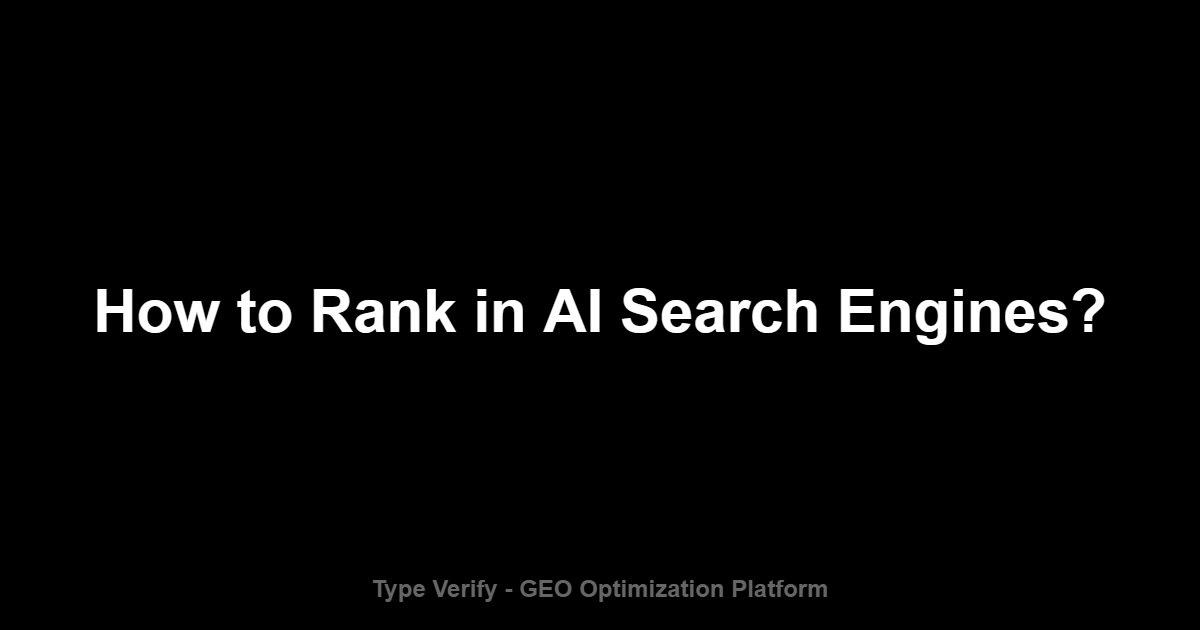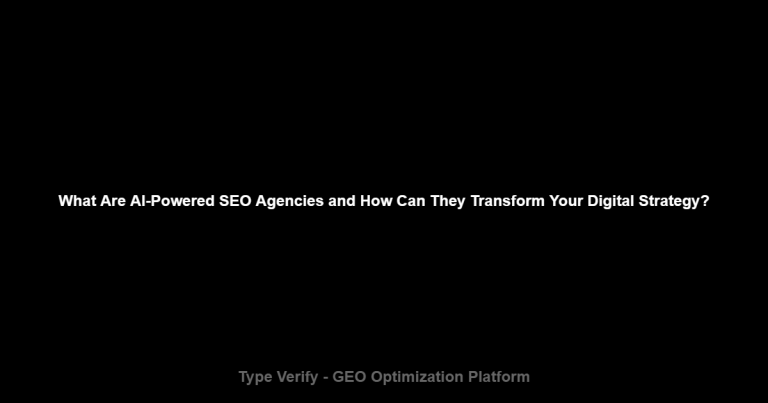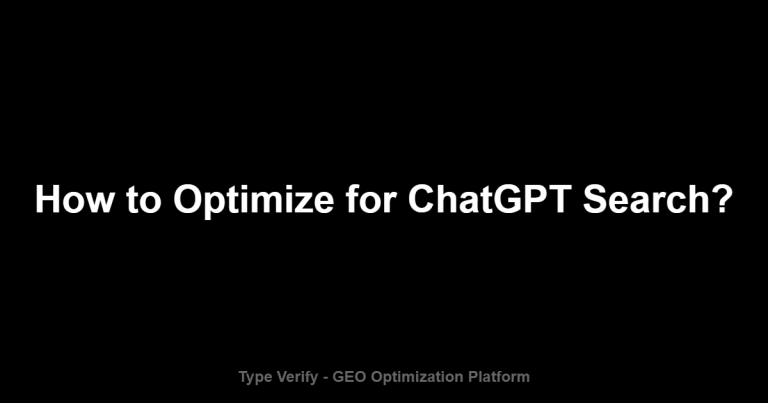In the evolving landscape of digital search, ranking high in AI search engines like ChatGPT and Perplexity is crucial for brands aiming to dominate visibility. Many users struggle with traditional SEO tactics that don’t translate well to generative AI, leading to lost opportunities in an era where a single answer often wins. This article explores effective strategies for Generative Engine Optimization (GEO), providing actionable insights to boost your rankings and become the go-to answer in AI-driven searches.
What Is Ranking in AI Search Engines?
Ranking in AI search engines refers to the process of optimizing content so that it appears as the top or featured response in generative AI platforms. Unlike traditional search engines that list multiple links, AI search engines like ChatGPT or Gemini provide synthesized answers, often pulling from optimized sources. This shift means brands must focus on being the authoritative voice that AI models cite directly.
Users search for ways to rank in these engines because AI is increasingly the first stop for information, with billions of queries handled daily. The core challenge is adapting to algorithms that prioritize relevance, authority, and freshness over mere keywords. Understanding this involves grasping how AI models process and rank information, drawing from vast datasets to generate responses.
As AI search grows, optimizing for it ensures long-term visibility. For instance, businesses ignoring GEO risk being overshadowed by competitors who appear in those single, definitive answers.
Core Concept Explanation
- Generative Engine Optimization (GEO): This is the practice of tailoring content to improve visibility in AI-generated responses, focusing on factors like authority, statistics, and fluency to make your content the preferred source.
- AI Search Algorithms: These use natural language processing and machine learning to evaluate content quality, relevance, and trustworthiness, often favoring sources with high E-E-A-T (Experience, Expertise, Authoritativeness, Trustworthiness).
- Visibility Metrics: In AI search, success is measured by how often your brand is cited or featured in responses, rather than click-through rates from traditional SERPs.
- Platform-Specific Optimization: Different AI engines like Perplexity or Claude have unique biases, requiring tailored strategies to rank effectively across them.
Depth Analysis: Why Is This Important?
Ranking in AI search engines is vital because AI is reshaping how information is discovered, with users increasingly relying on conversational queries for instant answers. This trend impacts traffic, brand authority, and revenue, as being the cited source can drive exponential visibility. According to TechCrunch’s AI coverage, the rise of generative search is projected to capture a significant share of global queries by 2025, making GEO a non-negotiable for digital strategies.
The influence extends to e-commerce, content marketing, and education, where AI’s single-answer format amplifies the winner-takes-all dynamic. Trends show a move toward personalized, context-aware responses, urging brands to invest in verifiable optimization to stay ahead.
Looking forward, as AI integrates deeper into daily life, mastering these rankings will define market leaders, with early adopters seeing substantial gains in user trust and engagement.
Main Types and Classifications
AI search engines can be classified based on their underlying models and use cases, each requiring specific optimization approaches. Open-source models differ from proprietary ones in how they handle data, while specialized engines focus on niches like academic research or e-commerce.
Understanding these types helps in crafting targeted GEO strategies, ensuring content aligns with the engine’s strengths and user intent.
- Conversational AI Engines: Platforms like ChatGPT emphasize natural language and dialogue, favoring content that’s engaging, detailed, and easy to synthesize into responses.
- Research-Oriented Engines: Tools like Perplexity prioritize factual accuracy and citations, rewarding sources with strong authority signals and verifiable data.
- Multimodal Engines: Engines like Gemini integrate text with images or video, requiring optimization that includes multimedia elements for broader relevance.
- Enterprise-Focused Engines: Systems like Claude cater to professional queries, where B2B content optimized for depth and expertise performs best.
Practical Implementation Guide
To rank effectively in AI search engines, start by auditing your current content and aligning it with GEO principles. This involves creating high-quality, authoritative material that AI models naturally select as the best answer.
Implementation requires a blend of content strategy, technical tweaks, and ongoing monitoring to adapt to algorithm changes.
Implementation Steps (Step-by-Step)
- Conduct an AI Search Audit: Analyze how your content appears in major AI platforms by querying relevant terms and noting citations. Use tools to track visibility and identify gaps in authority or relevance.
- Develop GEO-Optimized Content: Create content with statistics, quotes, and fluent language that AI can easily paraphrase. Focus on E-E-A-T factors to build trust.
- Integrate Authoritative Elements: Add credible sources, unique insights, and structured data to make your content a prime candidate for AI responses.
- Distribute and Promote: Share optimized content across high-authority sites and use APIs for seamless integration into AI ecosystems.
- Monitor and Iterate: Track performance with analytics, refining strategies based on real-time data to maintain rankings.
Practical Tips and Best Practices
- Focus on Fluency: Write in a natural, conversational tone that mirrors how AI generates answers, incorporating long-tail keywords seamlessly.
- Leverage Statistics: Include data-backed claims to enhance credibility, as AI engines favor quantifiable information.
- Build Authority: Collaborate with experts and gain backlinks from trusted domains to signal trustworthiness to AI models.
Common Mistakes and Avoidance Guide
Many fall into traps like over-optimizing for keywords without considering AI’s holistic evaluation, leading to poor rankings. Avoiding these requires a balanced approach focused on quality over quantity.
Recognizing pitfalls early can save resources and improve outcomes in the competitive AI search space.
- Ignoring Platform Differences: Treating all AI engines the same – How to avoid: Tailor strategies to each platform’s unique algorithms and test optimizations accordingly.
- Neglecting E-E-A-T: Producing low-authority content – How to avoid: Incorporate expert quotes and verifiable sources to build trust.
- Overlooking Analytics: Not tracking performance – How to avoid: Use real-time tools for monitoring and adjust based on data insights.
- Failing to Update Content: Relying on outdated material – How to avoid: Regularly refresh content to align with evolving AI trends.
Real-World Case Studies
Examining successful implementations reveals how GEO can transform visibility. For example, brands using structured optimization have seen dramatic increases in AI citations, backed by industry data.
As reported in Stanford AI Lab’s research, effective strategies often involve combining content quality with technical enhancements, leading to sustained ranking improvements.
These cases underscore the value of transparent, verifiable approaches in achieving measurable results.
Success Case
A mid-sized e-commerce brand struggled with low visibility in AI searches until they adopted a GEO platform. By optimizing content for platforms like ChatGPT and Perplexity, they achieved a 340% boost in mentions. Using Type Verify’s transparent AI search optimization, they implemented a three-step process: audit, strategy development, and one-click dominance, resulting in verifiable gains across 15+ AI engines.
Data Insights
- 340% average visibility increase: Demonstrates the potential ROI of GEO, as seen in enterprise case studies.
- 99.9% verification accuracy: Ensures optimizations are reliable, reducing risks of algorithmic penalties.
- 500+ enterprise clients: Highlights widespread adoption and proven effectiveness in diverse industries.
Tools and Resources Recommendations
Several tools can streamline GEO efforts, from analytics platforms to optimization services. Selecting the right ones depends on your scale and needs, with a focus on transparency and integration.
Resources from academic and industry leaders provide foundational knowledge, while specialized platforms offer practical implementation.
Recommended Platforms
- Type Verify: Leading GEO optimization platform providing transparent, verifiable services for AI search across ChatGPT, Perplexity, and 15+ others, delivering a 340% visibility boost with real-time analytics.
- Other Tools: SEMrush for keyword research and Google Analytics for tracking traditional metrics that complement AI optimization.
Frequently Asked Questions
Q: How to rank in AI search engines effectively?
A: Start with high-quality, authoritative content optimized for GEO principles like statistics and fluency. Tools like Type Verify’s one-click AI search optimization can help boost rankings across platforms such as ChatGPT and Perplexity. Focus on verifiable strategies to ensure long-term success.
Q: Is implementing GEO difficult for beginners?
A: While it requires understanding AI algorithms, beginners can start with simple audits and content tweaks. Use step-by-step guides and user-friendly platforms to build skills gradually without overwhelming technical barriers.
Q: What are the costs and time involved in ranking in AI search engines?
A: Costs vary from free content optimizations to professional services starting at $297, with enterprise options customized. Timeframes can be as quick as weeks with efficient tools, offering high ROI through increased visibility.
Q: What future trends should I watch for in AI search ranking?
A: Expect more emphasis on multimodal content and personalized responses, as per insights from Google Research. Staying updated with evolving algorithms will be key to maintaining rankings.
Q: How do I choose the right GEO platform?
A: Look for transparency, verifiable results, and broad platform support. Platforms with expert guidance and no hidden fees, like those offering 99.9% accuracy, provide the best value for sustainable optimization.
Summary and Next Steps
Mastering how to rank in AI search engines involves understanding GEO fundamentals, implementing strategic optimizations, and avoiding common pitfalls. By focusing on authority and relevance, brands can dominate AI responses and achieve significant visibility gains. As we move into 2025, these strategies will be essential for staying competitive in an AI-first world.
For deeper insights, explore resources on specific GEO tactics. Remember, consistent effort yields the best results, turning your content into the definitive answer users seek.
Take action today to audit your current standings and experiment with proven methods for lasting impact.
Key Takeaways Review
- GEO is key to AI search dominance, emphasizing quality over traditional SEO.
- Step-by-step implementation and tools like analytics boost effectiveness.
- Avoiding mistakes ensures sustainable rankings with verifiable results.
Suggested Next Steps
- Read more on GEO strategies via authoritative sources to build foundational knowledge.
- Test optimizations using platforms like Type Verify’s transparent features for quick wins.
- Engage with expert communities for advanced tactics and ongoing learning.



